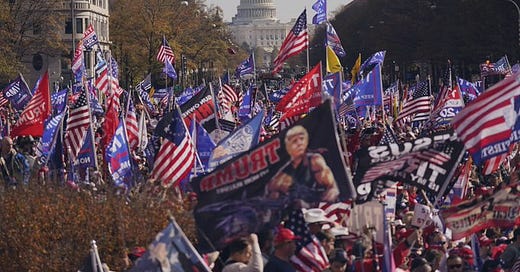Following on from the January 6 Capitol riot, and the insurrection that never was, US law enforcement agencies should be heralded for their inspiring dedication to tracking people down and destroying lives.
They’re a wonderful bunch at the FBI, pillars of decency and integrity and what a real law enforcement agency shouldn’t be about.
So much that the right to respect individual privacy heralds nothing but disdain from the beloved folk at the three-letter word agency, and that’s not including the CIA or NSA.
Tucker Carlson can attest to the NSA’s stellar abilities.
The FBI’s methods to track down those who exercised their right to protest about the events of the 2020 election, and what they believe took place, has sparked a heated debate about the balance between national security and individual privacy rights.
Three years after Jan 6, where men and women entered the US Capitol building as shown on video footage given to Tucker Carlson on his highly popular program prior to being sacked by Fox, show protestors being escorted by police around the building.
Carlson’s axing was because, not for lying but for telling the truth and exposing the lies and propaganda of the media and the overwhelming extent of corruption in Government.
January 6 was an example of Carlson’s quest for honesty, telling the truth and holding the government and media’s feet to the fire.
And regardless of how much video evidence there is suggesting the insurrection was a peaceful protest, FBI agitators and police were also part of the protest – riling up Trump supporters to riot and storm the building.
The FBI’s own insurrection worked, if you happen to be the Democrats driving the inquiry and seeking to prosecute anyone who was there and was a Trump supporter, which like many others is what happened to 61-year-old nurse, Susan Lee Hodges.
Maniacally obsessed is what the FBI have become as they try to identify and prosecute any person at the Capitol or in close vicinity – their enthusiasm hasn’t waned - demonstrating the government's commitment to holding individuals accountable.
For North Carolina nurse, Susan Lee Hodges, she was arrested after losing her hotel room key at the scene.
Hodges made what was a seemingly minor mistake, which allowed the FBI to trace her movements back to the Capitol, accessing data from her hotel and mobile phone records provided by telecommunications company, Verizon.
Adding to the evidence, the FBI used location data tying her mobile phone to the Capitol's interior during the riot, as well as her vocal participation in the events of that day.
The FBI’s unrelenting zealous pursuit of Hodges draws comparisons to those authoritarian regimes - raising concerns about the extent of government monitoring in the name of public safety.
Hodges, who has been charged with multiple offences for her role in the protest, demonstrates the intricate web of data law enforcement can use to access and track people down.
The response to the Capitol riot, particularly prosecuting people who participated, and participating is a word with the Jan 6 protest, where anyone seen to be a Trump supporter is deemed to ‘An enemy of the State’ must be hunted down. Susan Lee Hodges is one such person.
Hodges’ prosecution is a sharp contrast to the handling of other protests and instances of public unrest.
The disparity in law enforcement response reflects a more sinister issue of political bias and selective justice, pointing to leniency towards crimes associated with certain political or social causes.
Furthermore, the debate over the Capitol protest prosecutions shows the complexities of free speech and the right to protest, with some viewing the government's actions as a necessary response to an unprecedented attack on democracy, while others see it as overreach that could have chilling effects on political expression.
Protestors like Susan Lee Hodges should be a reminder to everyone about what the limits of surveillance and justice should be, and the meaning of accountability in a democracy.





Restocked and shared on Truth and farsebook💕